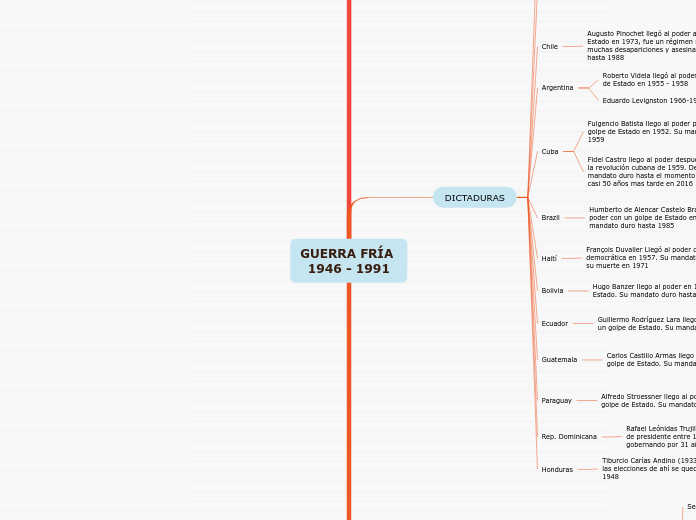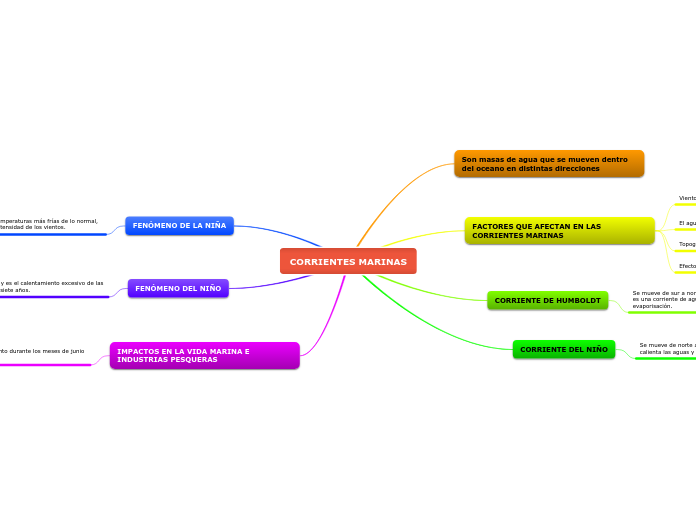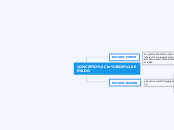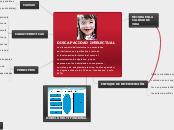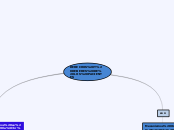GUERRA FRÍA
1946 - 1991
REVOLUCIONES
The ending of a story is essential. We all know that if the ending is weak, what happened before loses its importance. So make it unpredictable, but fair. A resolved ending answers all the questions and ties up any loose threads from the plot.
Mexicana,Cubana,Nicaraguense
This is the moment when the main character surpasses the last obstacle and finally faces their greatest challenge.
The climax usually follows one of these patterns:
- realization
- resolution
- choice
Type in your answer.
Avances
Financiamiento
Élites
México
Coexistencia con la revolución
Élite patriotica
Migración masiva a EE.UU
Iglesia
Teología de la liberación
Postulado básico del cristianismo como una forma de fundamentar la lucha por los más pobres
Cura Pérez Gregorio
Español, ELN
Camilo Torres
Colombiano, ELN
Apoyo a la contrarevolución
Anticomunistas
Intervención soviética
Apoyo económico y financiación
Populismo
Expropiación
La propiedad privada pasa a ser admisnistrada por el Estado
Propiedades
Clínicas
Universidades
Hoteles
Compañías
Nacionalización
Evitar o impedir que los capitales extranjeros se queden con las ganancias que genera la explotación de recursos
Petróleo
Estaño
Níquel
Oro
Carbón
Opositores
Instauración de dictaduras
violación de derechos humanos
persecusión política
Búsqueda de alianzas con países extranjeros
Sectores populares
Desde los campesinos hasta los comerciantes,
motivado más que todo por causas ideológicas, que por intéres material o mejora de condiciones.
DICTADURAS
The middle of the story is where you add layers of complications that will lead to the end. Reveal more about the character's journey. Did their personality go through changes? How did they overcome the challenges? And as you build up the story’s central conflict, make it more personal to that character. Also, from the middle act, you have to lead into the final act.
Honduras
Tiburcio Carías Andino (1933-1948) En 1933 ganó las elecciones de ahí se quedó en ese puesto hasta 1948
Se convirtió en uno de los regímenes más sangrientos de Centroamérica
Rep. Dominicana
Rafael Leónidas Trujillo (1930-1961) Ocupó el cargo de presidente entre 1930 y 1961, terminó gobernando por 31 años
Más de 50.000 personas fueron asesinadas durante su mandato
Paraguay
Alfredo Stroessner llego al poder en 1954 con un golpe de Estado. Su mandato duro hasta 1989
Stroessner fue depuesto en otro golpe de estado que tuvo lugar en 1989 orquestado por el que hasta ese momento había sido su mano derecha Andrés Rodríguez Pedotti
Guatemala
Carlos Castillo Armas llego al poder en 1954 con un golpe de Estado. Su mandato duro hasta 1957
Dejó a su partida un periodo convulso de inestabilidad política y levantamientos armados que, vistos en conjunto, podrían interpretarse como una guerra civil de casi tres décadas
Ecuador
Guillermo Rodríguez Lara llego al poder en 1972 con un golpe de Estado. Su mandato duro hasta 1976
Su dictadura marcó el inicio de un breve lapso en el cual Ecuador estuvo gobernado por regímenes militares
Bolivia
Hugo Banzer llego al poder en 1971 con un golpe de Estado. Su mandato duro hasta 1978
Contrajo una de las deudas externas más grandes que hubiera tenido Bolivia y su gobierno perpetró actos de corrupción muy sonados
Haití
François Duvalier Llegó al poder de manera democrática en 1957. Su mandato duro hasta
su muerte en 1971
Cuando murió en 1971, Haití era el país más pobre de América Latina
Brazil
Humberto de Alencar Castelo Branco llego al
poder con un golpe de Estado en 1964. Su
mandato duro hasta 1985
El régimen militar fomentó la colonización de los territorios de los pueblos indígenas, dilapidó recursos naturales, armó campos de concentración de pueblos indígenas y asesinó al menos 8.000 personas indígenas.
Cuba
There wouldn't be any tension and excitement in your story if there weren't any obstacles in your character's way.
Fidel Castro llego al poder después de liderar
la revolución cubana de 1959. Desde ahi su
mandato duro hasta el momento de su muerte
casi 50 años mas tarde en 2016
Fidel Castro estableció un partido único, controló todos los medios de comunicación y eliminó cualquier tipo de disidencia en la isla
Fulgencio Batista llego al poder por medio de un golpe de Estado en 1952. Su mandato duro hasta 1959
Después del colapso de la dictadura de Fulgencio Batista Cuba se convierte en un Estado socialista esto amerita el eventual bloqueo estadounidense contra Cuba
Argentina
Eduardo Levignston 1966-1973
Roberto Videla llegó al poder por medio de un golpe de Estado en 1955 - 1958
Chile
Augusto Pinochet llegó al poder a partir de un golpe de Estado en 1973, fue un régimen militar donde hubo muchas desapariciones y asesinatos. Estuvo en el poder hasta 1988
Colombia
Rojas Pinilla llego al poder por medio de un Golpe de Estado no sangriento. Su mandato duro hasta 1957
Es un dato interesante que aunque se dice que fue una dictadura, no todos están de acuerdo con tal termino y prefieren llamarla gobierno militar
Terminó por sustentar su gobierno en la violencia, la represión y la falta de libertades y esto hizo que los sectores que hasta entonces lo habían apoyado lo depusieran del cargo en 1957
Nicaragua
Each story has a main character and that character usually needs to solve a problem or challenge. The character's challenge is the one that creates tension throughout the story.
Dio inicio con la llegada al poder de Anastasio Somoza García en 1934 y luego de pasar el poder a sus hijos Luis Somoza Debayle y Luis Somoza Debayle. Duro hasta 1979
Type in any other challenges which other characters in the story need to face.
En 1970, la dictadura terminó con la Revolución Sandinista, luchando contra el régimen de los Somoza, acabando así con su poder.
INTERVENCIONISMO
In the beginning of the story (or the exposition), you will need to introduce the setting and characters. You might also want to introduce the main conflict. This part of the story is important because it gives the reader necessary background information and maybe even a first insight into a character’s personality.
NEOLIBERALISMO
The setting (time & place) of a story can change throughout the plot.
La economía se regula por medio de
la ley de oferta y demanda
Sensory details include sight, sound, touch, smell, and taste. These details are important because they create depth in your setting.
See a few examples below:
- the smell of fresh bread
- the scent of freshly cut grass
- rain falling onto the windshield etc.
Crisis mundial del petróleo
The weather is an important element in your story because it can highly influence the ambiance and the mood of the characters.
Los estados (EE.UU y R.U) promueven la política para evitar costos
Decide if you want to include an element of nature in your story. For example, a rainbow can be a very nice choice for a happy ending. The mist in a story can represent mystery and secrets. A thunder can appear in the background at the moment when the 'bad guy' of the story makes its appearance, etc.
Guerra fría
Your story can take place wherever your imagination will take you to.
For example: in an elevator, in an enchanted forest, etc. Don't forget to give details of the environment each time the setting changes, otherwise, the story can be confusing. Also, mention the seasons as each of them has unique weather and events.
EE.UU
Welfare state
URSS
The time of the story can also change. It can describe the event of a single day or can include an entire year's plot. Anyway, don't forget to mention it.
Promovía bienestar, educación y salud
insostenibilidad de guerras periféricas
Soviético
Está directamente relacionado con la instauración de dictaduras y también es una de las causas de las revoluciones
Norteamericano
Político y económico
F.D Roosevelt
Operación Cóndor
Golpes de estado
Escuela de las Américas
(militar)
LIBERALISMO
Characters are essential to a good story. Usually, the protagonist(s) is/are the most affected by the plot. Introduce a character by focusing on their actions, interests, and occupation, as the physical appearance doesn't make a difference in most cases.
es opuesto al sistema monárquico
Económico
Revolución Industrial
Inglaterra, Escocia, Alemania y
el resto de Europa
Político
Type in the name of your character.
Partidos políticos
What is your character's main goal?
fight Evilfind lovedefeat his/her enemyrule the worldmake friendstime travelmake an awesome discoveryOther
Parlamento
Which traits best describe the character's personality? Choose more if necessary:
introvertedloyalkindindependentquick-thinkingadventuresomeidealisticsweet-naturedcalmrisk-takercreativewittystrictfussyweirdclumsyharshaggressivecarelessclingingcowardlycrueldeceitfulimpulsiveOther
Revoluciones Burguesas
Choose the type of your chacter:
Protagonist (main character)Antagonist (main character's opponent)Flat (stereotypical character)Round (his/ her personality develops throughout the story)Static (doesn't evolve as a person throughout the story)Dynamic (dramatical change in personality)Confidant (the main character trusts him/ her)Foil (contrasting character who enhances the personality of another character)Other
Revoluciones Francesas
Add other qualities/attributes of the character.
